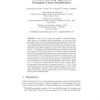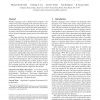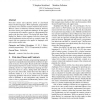117
click to vote
PROPOR
2010
Springer
15 years 8 days ago
2010
Springer
Abstract. In this paper we compare verb synonym information contained in four public-available lexical-semantic resources for Portuguese: TeP, PAPEL, Wiktionary and OpenThesaurusPT...
111
click to vote
PROPOR
2010
Springer
15 years 8 days ago
2010
Springer
Abstract. In this work, we apply and evaluate a machine-learningbased system to Portuguese clause identification. To the best of our knowledge, this is the first machine-learning-b...
136
click to vote
PROPOR
2010
Springer
15 years 8 days ago
2010
Springer
Abstract In this paper we assess to what extent the available Portuguese treebanks and available probabilistic parsers are suitable for outof-the-box robust parsing of Portuguese. ...
151
Voted
DLS
2010
15 years 12 days ago
2010
Dynamic mixin is a construct available in Ruby and other dynamic languages. It can be used as a base to implement a range of programming paradigms, such as dynamic aspectoriented ...
187
Voted
DLS
2010
15 years 12 days ago
2010
Factor is a new dynamic object-oriented programming language. It began as an embedded scripting language and evolved to a mature application development language. The language has...
171
click to vote
DLS
2010
15 years 12 days ago
2010
Dynamic languages such as Python allow programs to be written more easily using high-level constructs such as comprehensions for queries and using generic code. Efficient executio...
144
click to vote
DLS
2010
15 years 12 days ago
2010
Proxies are a powerful approach to implement meta-objects in object-oriented languages without having to resort to metacircular interpretation. We introduce such a meta-level API ...
124
click to vote
DLS
2010
15 years 12 days ago
2010
The design of the Icon programming language's expression evaluation system, which can perform limited backtracking, was unique amongst imperative programming languages when c...
125
click to vote
DLS
2010
15 years 12 days ago
2010
First-class classes add expressive power to class-based object-oriented languages. Most importantly, programmers ract over common scenarios with first-class classes. When it comes...




